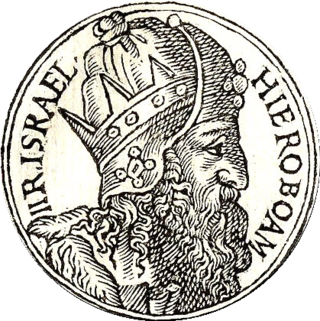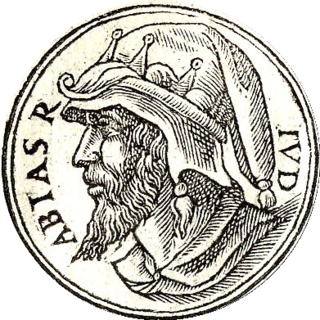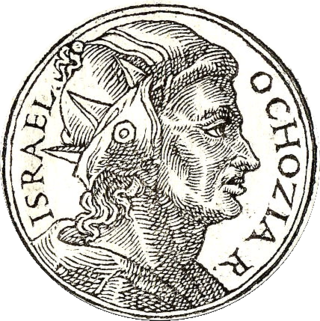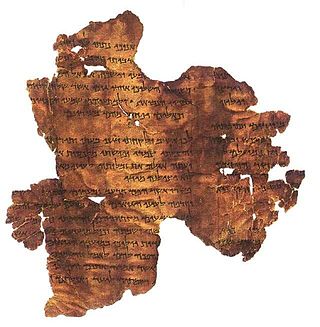Related Research Articles

Jeroboam I was, according to the Hebrew Bible, the first king of the northern Kingdom of Israel following a revolt of the ten tribes against Rehoboam that put an end to the United Monarchy.

Jeroboam II was the son and successor of Jehoash and the thirteenth king of the ancient Kingdom of Israel, over which he ruled for forty-one years in the eighth century BC. His reign was contemporary with those of Amaziah and Uzziah, kings of Judah.

Abijam was, according to the Hebrew Bible, the fourth king of the House of David and the second of the Kingdom of Judah. He was the son of Rehoboam and the grandson of Solomon. The Books of Chronicles refer to him as Abijah.

Jehoram was the ninth king of the northern Kingdom of Israel. He was the son of Ahab and Jezebel, and brother to Ahaziah and Athaliah.

Ahaziah was the eighth king of the northern Kingdom of Israel and the son of Ahab and Jezebel. Like his father, he reigned from Samaria. William F. Albright has dated his reign to 850–849 BC, while E. R. Thiele offers the dates 853–852 BC.
The Book of Nathan the Prophet and the History of Nathan the Prophet are among the lost books quoted in the Bible, attributed to the biblical prophet Nathan. They may be the same text, but they are sometimes distinguished from one another. No such text is found anywhere in the Hebrew Bible, so it is presumed to have been lost or removed from earlier texts.
The Story of the Prophet Iddo is a lost work mentioned in the Bible, attributed to the biblical prophet Iddo who lived at the time of King Rehoboam.
The [Book of the] Acts of Solomon is a lost text referred to in 1 Kings 11:41, which reads:

Ahijah the Shilonite was a Levite prophet of Shiloh in the days of Solomon, as mentioned in the Hebrew Bible's First Books of Kings. Ahijah foretold to Jeroboam that he would become king.

Jehu son of Hanani was a prophet mentioned in the Hebrew Bible, who was active during the 9th century BC.

The great Battle of Mount Zemaraim was reported in the Bible to have been fought in Mount Zemaraim, when the army of the Kingdom of Israel led by the king Jeroboam I encountered the army of the Kingdom of Judah led by the king Abijah I. About 500,000 Israelites were said to have lain dead after this single engagement, though most modern commentators consider the numbers to be either wildly exaggerated or symbolic, and some have even questioned its fundamental historicity. A chronology proposed by Edwin Thiele suggests the battle would have taken place around 913 BC.

Hosea 1 is the first chapter of the Book of Hosea in the Hebrew Bible or the Old Testament of the Christian Bible. This book contains the prophecies attributed to the prophet Hosea son of Beeri, and this chapter especially sets forth the spiritual whoredom of Israel by symbolical acts. It is a part of the Book of the Twelve Minor Prophets.

According to the First Book of Kings and the Second Book of Chronicles of the Hebrew Bible, Jeroboam's Revolt was an armed insurrection against Rehoboam, king of the United Monarchy of Israel, and subsequently the Kingdom of Judah, led by Jeroboam in the late 10th century BCE. The conflict, referring to the independence of the Kingdom of Samaria and the subsequent civil war during Jeroboam's rule, is said to have begun shortly after the death of Solomon lasting until the Battle of Mount Zemaraim. The conflict began due to discontent under the rule of Solomon's successor, his son Rehoboam, and was waged with the goal of breaking away from the United Monarchy of Israel. Though this goal was achieved very early on in the conflict, the war continued throughout the duration of Rehoboam's reign and well into the reign of his son, Abijam, who defeated the armies of Jeroboam but failed to reunite the kingdoms.

2 Kings 14 is the fourteenth chapter of the second part of the Books of Kings in the Hebrew Bible or the Second Book of Kings in the Old Testament of the Christian Bible. The book is a compilation of various annals recording the acts of the kings of Israel and Judah by a Deuteronomic compiler in the seventh century BCE, with a supplement added in the sixth century BCE. This chapter records the events during the reigns of Amaziah the son of Joash, king of Judah, as well as of Joash, and his son, Jeroboam (II) in the kingdom of Israel. The narrative is a part of a major section 2 Kings 9:1–15:12 covering the period of Jehu's dynasty.

1 Kings 22 is the 22nd chapter of the First Book of Kings in the Old Testament of the Christian Bible or the first part of Books of Kings in the Hebrew Bible. The book is a compilation of various annals recording the acts of the kings of Israel and Judah by a Deuteronomic compiler in the seventh century BCE, with a supplement added in the sixth century BCE. This chapter belongs to the section comprising 1 Kings 16:15 to 2 Kings 8:29 which documents the period of Omri's dynasty. The focus of this chapter is the reign of king Ahab and Ahaziah in the northern kingdom, as well as of king Jehoshaphat in the southern kingdom.

2 Chronicles 13 is the thirteenth chapter of the Second Book of Chronicles the Old Testament in the Christian Bible or of the second part of the Books of Chronicles in the Hebrew Bible. The book is compiled from older sources by an unknown person or group, designated by modern scholars as "the Chronicler", and had the final shape established in late fifth or fourth century BCE. This chapter belongs to the section focusing on the kingdom of Judah until its destruction by the Babylonians under Nebuchadnezzar and the beginning of restoration under Cyrus the Great of Persia. The focus of this chapter is the reign of Abijah, king of Judah.

1 Kings 11 is the eleventh chapter of the Books of Kings in the Hebrew Bible or the First Book of Kings in the Old Testament of the Christian Bible. The book is a compilation of various annals recording the acts of the kings of Israel and Judah by a Deuteronomic compiler in the seventh century BCE, with a supplement added in the sixth century BCE. This chapter belongs to the section focusing on the reign of Solomon over the unified kingdom of Judah and Israel. The focus of this chapter is Solomon's decline and death.

1 Kings 12 is the twelfth chapter of the Books of Kings in the Hebrew Bible or the First Book of Kings in the Old Testament of the Christian Bible. The book is a compilation of various annals recording the acts of the kings of Israel and Judah by a Deuteronomic compiler in the seventh century BCE, with a supplement added in the sixth century BCE. 1 Kings 12:1 to 16:14 documents the consolidation of the kingdoms of northern Israel and Judah: this chapter focusses on the reigns of Rehoboam and Jeroboam.

1 Kings 14 is the fourteenth chapter of the Books of Kings in the Hebrew Bible or the First Book of Kings in the Old Testament of the Christian Bible. The book is a compilation of various annals recording the acts of the kings of Israel and Judah by a Deuteronomic compiler in the seventh century BCE, with a supplement added in the sixth century BCE. 1 Kings 12:1 to 16:14 documents the consolidation of the kingdoms of northern Israel and Judah: this chapter focusses on the reigns of Jeroboam and Nadab in the northern kingdom and Rehoboam in the southern kingdom.

1 Kings 15 is the fifteenth chapter of the Books of Kings in the Hebrew Bible or the First Book of Kings in the Old Testament of the Christian Bible. The book is a compilation of various annals recording the acts of the kings of Israel and Judah by a Deuteronomic compiler in the seventh century BCE, with a supplement added in the sixth century BCE. 1 Kings 12:1-16:14 documents the consolidation of the kingdoms of northern Israel and Judah. This chapter focusses on the reigns of Abijam and Asa in the southern kingdom, as well as Nadab and Baasha in the northern kingdom.